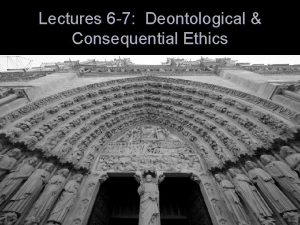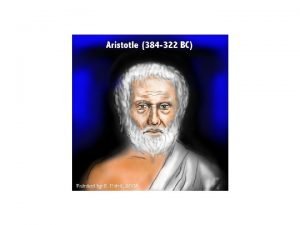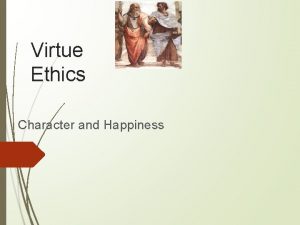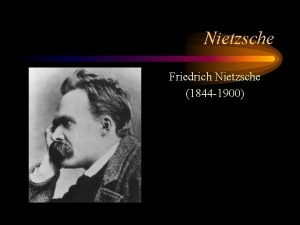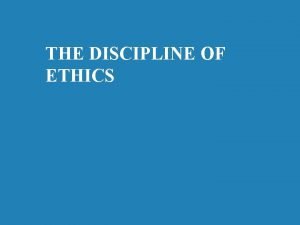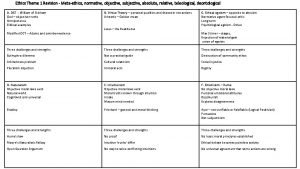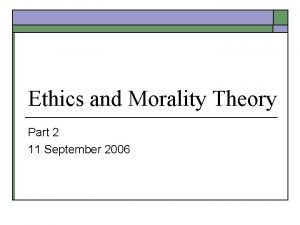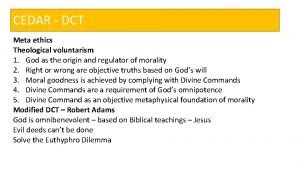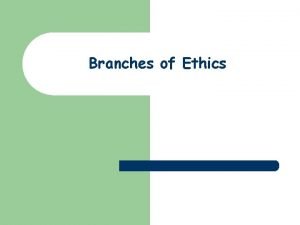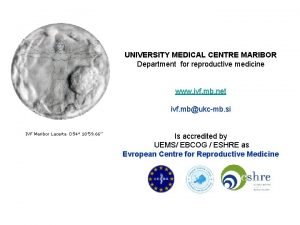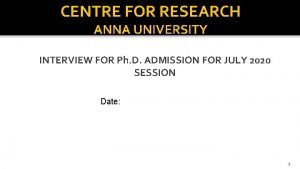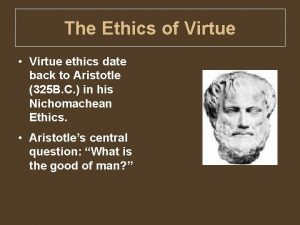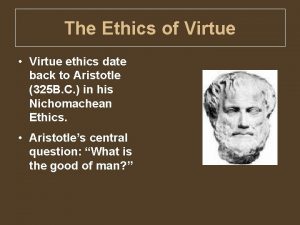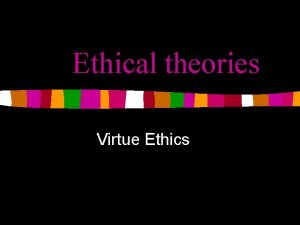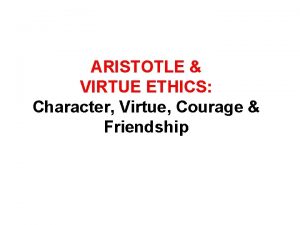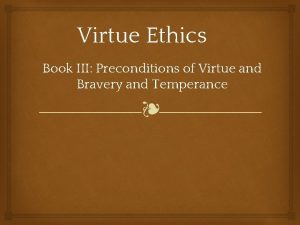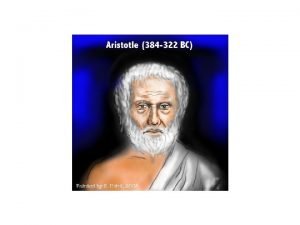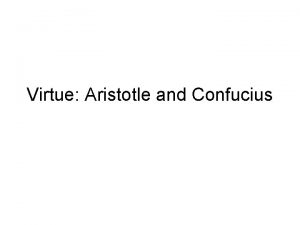Centre for Neoplatonic Virtue Ethics CNVE University of









































- Slides: 41

Centre for Neoplatonic Virtue Ethics (CNVE) University of Copenhagen Plotinus’ use of early Greek philosophers: the case of ethics Giannis Stamatellos, Post Doc Department of Media, Cognition and Communication

Centre for Neoplatonic Virtue Ethics (CNVE) Plotinus’ use of early Greek philosophers: the case of ethics Giannis Stamatellos (Post Doc) The presentation is divided in four parts: Part 1: Short introduction to Plotinus and the Presocratics Part 2: Plotinus’ virtue ethics Part 3: Presocratic ethics Part 4: Comparison of Plotinian and Presocratic ethics in the Enneads.

Centre for Neoplatonic Virtue Ethics (CNVE) Plotinus’ use of early Greek philosophers: the case of ethics Part 1 Plotinus and the Presocratics Giannis Stamatellos (Post Doc)

Centre for Neoplatonic Virtue Ethics (CNVE) Plotinus’ use of early Greek philosophers: the case of ethics Giannis Stamatellos (Post Doc) Plotinus (AD 204 -270) is regarded as the founder of Neoplatonism. He studied philosophy in Alexandria with the Middle-Platonic philosopher Ammonius Saccas. In 244, he settled in Rome and established his own philosophical school. His biographer and disciple, Porphyry, published Plotinus’ writings in six sets of nine treatises, named the Enneads.

Centre for Neoplatonic Virtue Ethics (CNVE) Plotinus’ use of early Greek philosophers: the case of ethics Giannis Stamatellos (Post Doc) Plotinus’ metaphysics is founded on two theoretical axes: 1. Three Hypostases of Being, named the One (en), the Intellect (nous) and the Soul (psyche) and 2. The Dual creative phases of each Hypostasis, named the phases of Procession (proodos) and Return (epistrophe).

Centre for Neoplatonic Virtue Ethics (CNVE) Plotinus’ use of early Greek philosophers: the case of ethics Giannis Stamatellos (Post Doc) One Procession Intellect Soul Return

Centre for Neoplatonic Virtue Ethics (CNVE) Plotinus’ use of early Greek philosophers: the case of ethics Giannis Stamatellos (Post Doc) Plotinus’ philosophical sources: Presocratics (c. 6 th-5 th c. BC) Plato (429– 347 BC) Aristotle (384– 322 BC) Stoics (Old Stoa: 4 th– 3 rd c. BC) Epicurus (341– 270 BC) Middle-Platonists and Peripatetics

Centre for Neoplatonic Virtue Ethics (CNVE) Plotinus’ use of early Greek philosophers: the case of ethics Giannis Stamatellos (Post Doc) Plotinus the Presocratics 18 Direct References By name references to Anaxagoras, Heraclitus, Empedocles, Parmenides and the Pythagoreans More than 120 indirect allusions to other eminent Presocratics such as Thales, Anaximander and Democritus

Centre for Neoplatonic Virtue Ethics (CNVE) Plotinus’ use of early Greek philosophers: the case of ethics Giannis Stamatellos (Post Doc) The origins of the Presocratic sources in the Enneads is a controversial issue. There are three possible alternatives: (1)Plotinus had a firsthand contact with the original copy of some leading Presocratics; (2)Plotinus collects his information from secondary sources such as philosophical anthologies or handbooks of the period; (3)Plotinus derives his Presocratic material intermediately from Plato and/or Aristotle.

Centre for Neoplatonic Virtue Ethics (CNVE) Plotinus’ use of early Greek philosophers: the case of ethics Giannis Stamatellos (Post Doc) Being, Intellect, Eternity Soul, Cosmos, Selfknowledge Heraclitus (fl. c. 500 BC) Plotinus (AD 204 -270) Cosmos, Soul, Matter Parmenides (fl. c. 515 BC) Intellect, Matter The One Empedocles (c. 490 -430 BC) Pythagoras (c. 580 -500 BC) Anaxagoras (c. 500 -428 BC)

Centre for Neoplatonic Virtue Ethics (CNVE) Plotinus’ use of early Greek philosophers: the case of ethics Part 2 Plotinus’ Virtue Ethics Giannis Stamatellos (Post Doc)

Centre for Neoplatonic Virtue Ethics (CNVE) Plotinus’ use of early Greek philosophers: the case of ethics Giannis Stamatellos (Post Doc) “If we talk about God without true wisdom, God is only a name” (Ennead II. 9 Against the Gnostics). Every virtue is a purification which leads to the soul’s ascent to the divine world of true beauty and intelligence (Ennead I. 6 On Beauty). Plotinus’ virtue ethics is underlined by Platonic and Aristotelian elements.

Centre for Neoplatonic Virtue Ethics (CNVE) Plotinus’ use of early Greek philosophers: the case of ethics Giannis Stamatellos (Post Doc) Plato’s virtue ethics is a from of eudaemonistic-based ethics. Human well-being (eudaimonia) is the highest aim of moral thought in harmony with the perfection of the Forms. Virtues are the prerequisite skills of character development and human excellence towards transcend goodness and divine knowledge.

Centre for Neoplatonic Virtue Ethics (CNVE) Plotinus’ use of early Greek philosophers: the case of ethics Giannis Stamatellos (Post Doc) Aristotle sets out his ethical theory in two influential works: the Nicomachean Ethics and the Eudemian Ethics. For Aristotle, ethics is practical philosophy dealing with the character and behavior of the individual in the community.

Centre for Neoplatonic Virtue Ethics (CNVE) Plotinus’ use of early Greek philosophers: the case of ethics Giannis Stamatellos (Post Doc) What is the purpose (telos) of human life? In Aristotle’s ethics there must be an ‘end for all means’, and the final end of all actions has to be happiness (eudaimonia) i. e. the activity of the soul in accordance with reason, the highest faculty of the human mind.

Centre for Neoplatonic Virtue Ethics (CNVE) Plotinus’ use of early Greek philosophers: the case of ethics Giannis Stamatellos (Post Doc) Plotinus’ ethical theory is mainly exposed in Enneads I. 2 On Virtues and I. 4 On Well Being. Throughout the nine treatises of Ennead I, various philosophical aporias on virtue ethics can be found with special reference to human life, eudaimonia and the excellence of the wise.

Centre for Neoplatonic Virtue Ethics (CNVE) Plotinus’ use of early Greek philosophers: the case of ethics Giannis Stamatellos (Post Doc) The wise man (spoudaios) follows the perfect life of Intellect, the life of the higher soul purely contemplating the eternal reality of Nous. The real virtue of the wise is to be aware of the perfection, self-sufficiency and completeness of the divine realm.

Centre for Neoplatonic Virtue Ethics (CNVE) Plotinus’ use of early Greek philosophers: the case of ethics Giannis Stamatellos (Post Doc) Level State Virtues Wisdom Justice Self-Control Courage Practical Civic Discursive reason Soul’s minds its Harmony own business between passion where ruling and -reason being ruled are concerned Emotions Purification Body. Soul acts alone Ruled by reason and intellect without opposition Not being affected by the body Not afraid of departing from the body Contemplation Soul. Nous Soul has immediate contact with intellect Soul’s activity towards intellect Soul’s inward turning to intellect Free of affections Intelligible Prototypes Nous Pure intellection: soul become divine intellect Soul follows its own proper activity Selfconcentration Abiding pure in itself

Centre for Neoplatonic Virtue Ethics (CNVE) Plotinus’ use of early Greek philosophers: the case of ethics Part 3 Presocratic Ethics Giannis Stamatellos (Post Doc)

Centre for Neoplatonic Virtue Ethics (CNVE) Plotinus’ use of early Greek philosophers: the case of ethics Giannis Stamatellos (Post Doc) The Homeric heroes portrayed the moral ideal of human excellence. The Iliad and the Odyssey describe two different heroic personas: Achilles in the Iliad is the most excellent in battle and passion, while Odysseus in the Odyssey is the most excellent in cunning and patience.

Centre for Neoplatonic Virtue Ethics (CNVE) Plotinus’ use of early Greek philosophers: the case of ethics Giannis Stamatellos (Post Doc) Key terms of Presocratic ethics are: ethos (character) and arête (excellence, virtue) related to agathos (good), kakos (bad or evil), dike (justice) and phronesis (wisdom).

Centre for Neoplatonic Virtue Ethics (CNVE) Plotinus’ use of early Greek philosophers: the case of ethics Giannis Stamatellos (Post Doc) Thales of Miletus(fl. c. 585 BC) seems to have introduced the Delphic saying gnōthi sauton ‘know thyself’, which supplements the Delphic mēden agan, and associates Presocratic philosophy with selfknowledge, self-control, wisdom and justice.

Centre for Neoplatonic Virtue Ethics (CNVE) Plotinus’ use of early Greek philosophers: the case of ethics Giannis Stamatellos (Post Doc) Xenophanes of Colophon (c. 570 c. 475 BC) was the first philosopher who criticized Homer and Hesiod for their immoral epics. Fr 11: Homer and Hesiod have attributed to the gods everything that is blameworthy and disgraceful among humans theft and adultery and mutual trickery

Centre for Neoplatonic Virtue Ethics (CNVE) Plotinus’ use of early Greek philosophers: the case of ethics Giannis Stamatellos (Post Doc) Heraclitus of Ephesus (fl. c. 500 BC) maintained that the gods should not be blamed or appraised for the destiny of humans. Humans are responsible for their actions; human destiny is depended on wisdom and selfknowledge. A person's character is his destiny

Centre for Neoplatonic Virtue Ethics (CNVE) Plotinus’ use of early Greek philosophers: the case of ethics Giannis Stamatellos (Post Doc) Pythagorean ethics is related to moral practice and the purification of the soul. Pythagoreans assert that “virtue is harmony” particularly related to health, goodness and god himself.

Centre for Neoplatonic Virtue Ethics (CNVE) Plotinus’ use of early Greek philosophers: the case of ethics Giannis Stamatellos (Post Doc) Empedocles of Acragas (c. 490430 BC) considered human character and behaviour as determined on the physical structure of the cosmos. As beings in the cosmos are produced in various proportions of the four elements under the power of Love and Strife, humans have to choose the right proportions in order to create their own ethos

Centre for Neoplatonic Virtue Ethics (CNVE) Plotinus’ use of early Greek philosophers: the case of ethics Giannis Stamatellos (Post Doc) Democritus of Abdera (ca. 460– 370 BC) seems to be the first Presocratic who offers a complete ethical work On Good Spirits covering a wide range of ethical issues such as fortune, prudence, pleasure, favours, friendship, punishment and child-caring.

Centre for Neoplatonic Virtue Ethics (CNVE) Plotinus’ use of early Greek philosophers: the case of ethics Part 4 The Case Ethics Giannis Stamatellos (Post Doc)

Centre for Neoplatonic Virtue Ethics (CNVE) Plotinus’ use of early Greek philosophers: the case of ethics Giannis Stamatellos (Post Doc) Plotinus’ use of Presocratic ethics can be traced in: • Ennead IV. 8 On the Descent of the Soul into the Bodies • Ennead V. 9 On Intellect, the Forms and Being • Ennead I. 6 On Beauty.

Centre for Neoplatonic Virtue Ethics (CNVE) Plotinus’ use of early Greek philosophers: the case of ethics Giannis Stamatellos (Post Doc) Plotinus’ discussion of the Presocratic ethics involves: • Soul’s noetic ascent • Self-knowledge • Wisdom and Responsibility. The Presocratic concepts under consideration are: • Heraclitus’ ethos and arête and • Empedocles’ daimon.

Centre for Neoplatonic Virtue Ethics (CNVE) Plotinus’ use of early Greek philosophers: the case of ethics Giannis Stamatellos (Post Doc) In Ennead IV. 8 [6] On the Descent of the Soul into the Bodies Plotinus discussion involves: (1) the metaphysics of the ensouled bodies; (2) second, the ethical and epistemological value of the material universe. (3)Plotinus’ intention is to deny the pessimistic conceptions of the material world.

Centre for Neoplatonic Virtue Ethics (CNVE) Plotinus’ use of early Greek philosophers: the case of ethics Giannis Stamatellos (Post Doc) How the soul descended into the bodies? In Ennead IV. 8, there are two cases for the soul’s descent : (1) the unwilling: assigned by divine necessity for the purpose of the perfection of the whole; (2) the willing: caused by the Soul’s own motion which makes the Soul suffer by the experience of evil. The “fault” (amartia) of Soul refers to: (1) the motives of the soul (2) to the evil actions the soul

Centre for Neoplatonic Virtue Ethics (CNVE) Plotinus’ use of early Greek philosophers: the case of ethics Giannis Stamatellos (Post Doc) Plotinus’ aim in IV. 8 is to reconcile the alleged contradictions between the ancient theories with regard to the soul’s ‘sin’ or ‘fall’ into the body and support a positive perspective of the material world as the necessary effect of the divine splendour. Plotinus’ conclusion is that every individual soul is not descended as a whole, but its intelligible part always remains at a higher level.

Centre for Neoplatonic Virtue Ethics (CNVE) Plotinus’ use of early Greek philosophers: the case of ethics Giannis Stamatellos (Post Doc) To support his positive perspective of matter, Plotinus recalls the authority of • Heraclitus • Empedocles • The Pythagoreans and • Plato.

Centre for Neoplatonic Virtue Ethics (CNVE) Plotinus’ use of early Greek philosophers: the case of ethics Giannis Stamatellos (Post Doc) Plotinus’ ethical refers to Presocratic ethics. The discussion involves the Plotinian Soul and the Presocratic Psyche • Soul’s noetic ascent in Plotinus corresponds to the Presocratic concept of the cycles of the soul; soul’s virtue and purification. • Soul’s reflective act of self-knowledge in Plotinus corresponds to the Presocratic arête to ‘know thyself’ • Soul’s self-governance and responsibility of the Plotinian spoudaios corresponds to Presocratic excellence of the aristos.

Centre for Neoplatonic Virtue Ethics (CNVE) Plotinus’ use of early Greek philosophers: the case of ethics Giannis Stamatellos (Post Doc) Soul’s noetic ascent could be traced back to Heraclitus and Empedocles with special reference to Heraclitus’ ethics of arête and Empedocles’ psychology of daimon.

Centre for Neoplatonic Virtue Ethics (CNVE) Plotinus’ use of early Greek philosophers: the case of ethics Giannis Stamatellos (Post Doc)

Centre for Neoplatonic Virtue Ethics (CNVE) Plotinus’ use of early Greek philosophers: the case of ethics Giannis Stamatellos (Post Doc) In Ennead I. 6 On Beauty Plotinus recognizes the power of purification (katharsis) of central virtues such as self-control, courage and wisdom. Soul’s purification echoes Heraclitus’ purity of the wise and Empedocles’ cycles of daimon. In his work Purifications, Empedocles describes himself as an exiled daimon that belongs to a divine nature. Likewise, Plotinus in Ennead IV. 8 describes himself as an inhabitant of a higher divine realm.

Centre for Neoplatonic Virtue Ethics (CNVE) Plotinus’ use of early Greek philosophers: the case of ethics Giannis Stamatellos (Post Doc) Self-knowledge is an inward activity. Soul has to know itself in order to ascent to the divine by imitating the act of Nous self thinking identity. Soul’ self-knowing activity signifies the contemplative virtues of wisdom, justice and selfcontrol corresponding at the level of soul-mind.

Centre for Neoplatonic Virtue Ethics (CNVE) Plotinus’ use of early Greek philosophers: the case of ethics Giannis Stamatellos (Post Doc) The moral responsibility of the Plotinian spoudaios reflects the Heraclitean aristos who is able to exercise in him the arête of sophrosine by following the path of self-knowledge and wisdom. The soul of the Plotinian spoudaios embarks on the ship of his spirit trough the voyage of life; the life of the wise is depended both on the powers of the universe and his own choices.

Centre for Neoplatonic Virtue Ethics (CNVE) Plotinus’ use of early Greek philosophers: the case of ethics Conclusion Giannis Stamatellos (Post Doc)
 Cnve
Cnve Virtue ethics example in real life
Virtue ethics example in real life Virtue ethics
Virtue ethics Opposite of utilitarianism
Opposite of utilitarianism Difference between utilitarianism and virtue ethics
Difference between utilitarianism and virtue ethics Deontological ethics
Deontological ethics Eternal law
Eternal law Virtue ethics vs utilitarianism
Virtue ethics vs utilitarianism Natural law summary
Natural law summary Kantian deontology vs utilitarianism
Kantian deontology vs utilitarianism Value vs virtue
Value vs virtue Maximalism utilitarianism
Maximalism utilitarianism Virtue ethics revision
Virtue ethics revision Plato virtue ethics
Plato virtue ethics What is duty ethics
What is duty ethics Aristotle virtue ethics
Aristotle virtue ethics Virtue ethics in nursing
Virtue ethics in nursing Virtue thics
Virtue thics Michael slote
Michael slote Utilitarianism theory definition
Utilitarianism theory definition Objections to aristotle's virtue ethics
Objections to aristotle's virtue ethics Master morality
Master morality William frankena ethics summary
William frankena ethics summary Virtue theory in business ethics
Virtue theory in business ethics Virtue ethics
Virtue ethics Virtue ethics definition
Virtue ethics definition Virtue and happiness aristotle
Virtue and happiness aristotle Centroid by integration
Centroid by integration Centroid and centre of gravity
Centroid and centre of gravity Descriptive ethics vs normative ethics
Descriptive ethics vs normative ethics Briefly summarise
Briefly summarise Micro and macro ethics
Micro and macro ethics Factual inquiry in ethics
Factual inquiry in ethics Methaethics
Methaethics Descriptive ethics vs normative ethics
Descriptive ethics vs normative ethics Beneficence examples
Beneficence examples Metaethics vs normative ethics
Metaethics vs normative ethics Branches of ethics
Branches of ethics Teleological ethics vs deontological ethics
Teleological ethics vs deontological ethics Ivf maribor
Ivf maribor Clarivites
Clarivites Ontario university application center
Ontario university application center





